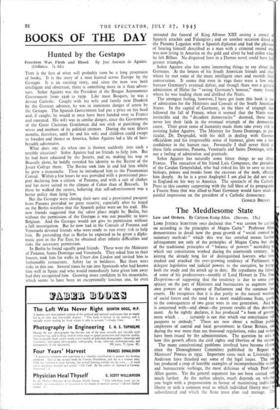BOOKS OF THE DAY
Hunted by the Gestapo
Freedom Was Flesh and Blood. By Jose Antonio de Aguirre. (Gollancz. 7s. 6d.)
Tins is the first of what will probably soon be a long procession of books. It is the story of a man hunted across Europe by the Gestapo. It is an exciting story, and since the man was both intelligent and observant, there is something more in it than adven- ture. Senor Aguirre was the President of the Basque Autonomous Government from 1936 to 1939. Like most Basques, he was a devout Catholic. Caught with his wife and family near Dunkirk by the German advance, he was in imminent danger of arrest by the Gestapo. The Spanish Government had put a price on his head and, if caught, he would at once have been handed over to Franco and executed. His wife was in similar danger, since the Government of the Great Christian Gentleman did not stick at punishing the wives and mothers of its political enemies. During the next fifteen months, therefore, until he and his wife and children could escape to Sweden and thence to America, Sefior Aguirre led a life of hair- breadth adventures.
What does one do when one is thrown suddenly into such a terrible situation? Senor Aguirre had no friends to help him. But he had been educated by the Jesuits, and so, making his way to Brussels alone, he boldly revealed his identity to the Rector of the Jesuit College there. The Rector took him in and hid him whilst he grew a moustache. Then he introduced him to the Panamanian Consul. Within a few hours he was provided with a provisional pass- port declaring him a citizen of Panama, and with a suit of clothes and hat more suited to the climate of Colon than of Brussels. In these he walked the streets, believing that self-advertisement was a better policy than lying low.
But the Gestapo were closing their nets and a provisional passport from Panama provided no great security, especially after he heard on the Berlin wireless that the Spanish police were on his trail. His new friends suggested that the safest place might be Berlin, but without the permission of the Gestapo it was not possible to leave. Belgium. And the Gestapo would not give its permission without a full investigation. But he now had in the Consuls of Panama and Venezuela devoted friends who were ready to run every risk to help him, By pretending that in Berlin he expected to be given a diplo- matic post in the Far East, he obtained after infinite difficulties and risks the necessary permission.
In Berlin he found equally good friends. These were the Ministers of Panama, Santo Domingo and Venezuela. They asked him to their houses, took him for walks in Unter den Linden and invited him to fashionable restaurants. Safety lay in boldness. But there were risks in this too. Several times he ran into Spaniards who had known him well in Spain and who would immediately have given him away had they recognized him. Growing more confident in his moustache, which seems to have been an exceptionally luscious one, he even attended the funeral of King Alfonso XIII among a crowd of Spanish attaches and Falangists ; and on another occasion dined at the Panama Legation with a Spanish diplomat and had the pleasure of hearing himself described as a man with a criminal record who was now living in America on the gold and silver he had stolen when he left Bilbao. No disguised hero in a Dumas novel could have had greater triumphs.
Seiior Aguirre also has some interesting things to say about the Germans. At the houses of his South American friends and else- where he met some of the more intelligent ones and records their conversation. It seems that even in 1940 there were a few who foresaw Germany's eventual defeat, and though there was a general admiration of Hitler for " saving Germany's honour," many feared where he was leading them and disliked the Nazis.
The strongest feeling, however, I have got from this book is one of admiration for the Ministers and Consuls of the South American States. In the capital of Germany, in the blare of triumph that followed the fall of France, when it seemed that the Nazis were invincible and the " decadent democracies " doomed, these men never lost their faith in the eventual triumph of the democratic cause. Their great sense of humanity made them take every risk in assisting Senor Aguirre. The Minister for Santo Domingo, in par- ticular, Dr. Despradel, with his skill in dealing with German officialdom and his irrepressible sense of humour, gives one a new confidence in the human race. Personally I shall never think of these little countries, Panama, Venezuela and Santo Domingo, with- out a feeling of admiration and gratitude.
Senor Aguirre has naturally some bitter things to say about Franco. The execution of his friend Luis Companys, the president of the Catalan Generalidad, who had risked his life to save so many bishops, priests and monks from the excesses of the mob, affected him deeply. As he is a great Anglophil I am glad he did not stop in England on his way to America. The spectacle of the Catholic Press in this country supporting with the full blast of its propaganda a Fascist State that was allied to Nazi Germany would have made a painful impression on the president of a Catholic democracy.
GERALD BRENAN


























 Previous page
Previous page